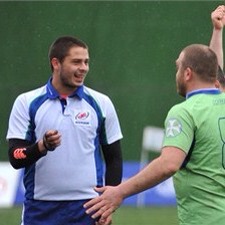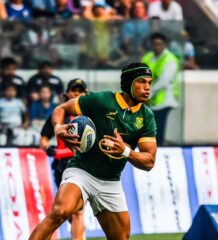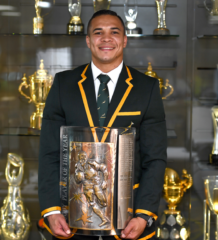Ireland helps to raise bar for Georgian refs
Nika Amashukeli, one of the referees who attended the programme in Ireland. Photo: Tamuna Kulumbegashvili
When Georgia come to Dublin to face Ireland on Sunday, the rivalry between the two groups of players will be what makes the headlines.
Behind the scenes, though, there is also a special bond and spirit of co-operation between the Irish Rugby Football Union (IRFU) and Georgian Rugby Union (GRU) that should be celebrated as much as the big match occasion.
With victories over Canada and Samoa last November, winning the FIRA-AER European Nations Cup Division 1A and reaching Rugby World Cup 2015 as the top European qualifier, Georgian rugby is in rude health on the field.
Add to this the success of the Webb Ellis Cup appearance in Tbilisi earlier this year and the huge crowds in attendance for their ENC home ties with Russia and Romania, the affection and enthusiasm that Georgians have for the sport is also on a high.
In January 2013, however, the situation regarding referee succession planning was in stark contrast to this positive playing progress.
We asked the IRFU for support
The deputy head of the GRU refereeing committee, Luka Kilasonia, explains: “Last year, our Union had issues with refereeing so we decided to seek some help from the IRB and some member unions. Our president and our chairman for international affairs asked the IRFU for support and that is how our relationship started.”
David O’Brien, who works as an IRFU referee development officer, has been tasked to consult with Georgian referees to help find solutions. The biggest challenge he describes was a lack of elite referees to officiate in Georgia’s very competitive professional division.
“Their main issue was their refereeing at the top level. They had five older referees who had served the game for years and they were coming close to retirement age,” said O’Brien.
“They had no one immediately underneath to fill that gap. Some of these older guys were doing two matches every weekend so that just was not sustainable. That is probably what drove them to realise there was an immediate problem.”
O’Brien initially travelled to Georgia on a “fact-finding mission” and in the past 18 months he has been there four times, with Georgian referees coming to Ireland to gain experience and attend IRFU workshops. This strategy is to stay in place for three years with the IRFU lending its services and making resources available to the GRU free of charge.
Positive effects already noticed
Already, positive changes have been noticed. Kilasonia says: “We have had wonderful support from the IRFU, from David O’Brien. It has just been a year but there has been a lot of success with the project. We have to work two more years together.”
O’Brien expands on the progress made so far. “Within one year we have up-skilled three younger referees to fill that void. Out of those five older referees, three have retired. So, we have five young referees with two of the older guys still officiating in the top division,” he says.
“If we did not put these structures in place immediately, we would only have two referees for their top division. If they hadn’t come to us, they would have been in a lot of trouble.”
The Irishman is keen to stress that the approach to the Georgian refereeing situation is a long-term strategy.
“You cannot just look at the top level. You cannot just throw everything at the problem in one season. It is an ongoing process from the bottom up and the Georgians have really bought into that.
Vision is player-focused
“The vision and the mission we had is very player-focused. The idea is that the better the referees, the better the matches and this ultimately means that better players come through their systems. That is how we operate in Ireland.”
This international co-operation is something both sets of referees enjoy and for O’Brien it has shed light on why the Georgian psyche is so suited to rugby.
“Rugby is an extension of the values in Georgian society – strength and combativeness mixed with a great sense of camaraderie. They really like to represent their country in every way. On the pitch they can be very difficult to play against but off the pitch they really espouse the true values of rugby.
“I suppose in terms of the size and populations of the two countries, it also might just feel like a natural fit. The IRB is aware the IRFU invests heavily in referees. We all hope that some of the success we have could map into the Georgian systems.”
O’Brien’s Georgian counterpart, Kilasonia, also sees the unifying force of their sport, where the on-field competition is fierce but a spirit of co-operation exists once the final whistle blows.
“Rugby is a big family, where everyone is supportive,” he says.
Courtesy of IRB
Related Posts
« Australia return to third in latest rankings SARU ClubWise course producing qualified administrators »

















